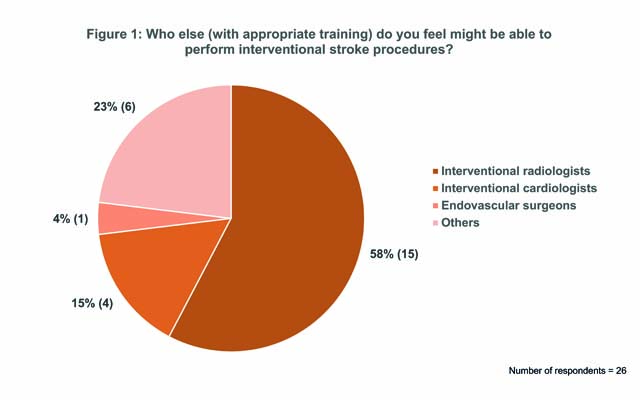
According to a BIBA MedTech survey, 52% of neurointerventionalists believe that they are the only specialists who have the relevant skills and experience to perform interventional stroke procedures (e.g. mechanical thrombectomy). However, of those who believe other specialities—with the appropriate training—could potentially perform such procedures, 58% propose interventional radiologists. Previous discussions about other specialists performing interventional stroke procedures have focused on interventional cardiologists.
Mechanical thrombectomy is now an established treatment for patients with emergent large vessel occlusion, but who should perform this procedure is controversial. A 2016 multisociety consensus document—published in the Journal of NeuroInterventional Surgery—states that “physicians providing intra-arterial treatment for acute stroke are required to have appropriate training and experience for the performance of neuroangiography and interventional neuroradiology”. However, some believe that restricting interventional stroke procedures (specifically, mechanical thrombectomy) to neurointerventionalists may limit the number of patients who are able to access the therapy given the lack of relevant operators in some areas. For example, in the 2019 Vascular and Endovascular Challenges Update, cardiologist Jan Kovac writes “collaboration of various interventional specialists is desirable to deliver this therapy to a wider population”.
A previous poll on this issue, conducted at the 2019 Charing Cross Symposium (15–18 April, London, UK), indicated that 57% of respondents were against mechanical thrombectomy being restricted to neurointerventionalists. However, these respondents were predominantly vascular and endovascular surgeons. Therefore, BIBA MedTech sought to understand how practising neurointerventionalists felt about the issue.
Of 54 neurointerventionalists surveyed, 52% agreed that “only neurointerventionalists should perform interventional stroke therapy” vs. 48% who did not agree. Of those who did not agree (26), 58% said “interventional radiologists” in response to the question “who else (with appropriate training) do you feel might be able to perform interventional stroke procedures?”. Of note, only 15% said interventional cardiologists. See Figure 1.
In his chapter in the 2019 Vascular and Endovascular Challenges Update, Kovac proposes interventional cardiologists as suitable alternative specialists to perform interventional stroke procedures. He states that cardiologists are “no strangers to stroke care”, commenting that “cardiologists have traditionally played an important role in stroke prevention by providing both comprehensive medical and interventional management of cardiovascular risk factors [for stroke] including atrial fibrillation”. He adds: “It appears reasonable to complement the existing workforce of neurointerventional radiologists by interventional cardiologists being properly trained in mechanical thrombectomy, joining the interdisciplinary stroke teams led by neurologists”. However, Kovac does stress that there is “absolutely no doubt that a fully trained neurointerventionalist, with audited practice outcomes, and adequate skill maintenance, is the optimal provider of mechanical thrombectomy for stroke patients”.
The 2016 multisociety consensus statement observes: “The technical skills needed to safely deliver devices into the intracranial circulation are significantly more involved than simply placing a catheter for medical infusion. Catheter skills from other circulations do not replace the need for formal training in safe intracranial microcatheter navigation and device placement.”
BIBA Briefings is an online platform that gives in-depth analysis of the latest market intelligence from BIBA MedTech Insights. It also reviews the latest industry news and pipeline developments.
For editorial enquiries, please contact Dawn Powell: [email protected]
For sales enquiries (including BIBA MedTech Insights), please contact Merveille Anderson: [email protected]










